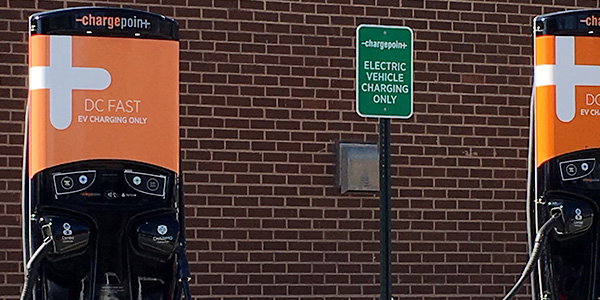By Michael Kuser
The New York Public Service Commission on Thursday authorized utilities to spend $31.6 million to build up to 1,075 fast-charging electric vehicle stations and recover costs from ratepayers over seven years (18-E-0138).
The program is intended to help spur sales of EVs by reducing people’s “range anxiety” — the fear of running out of juice on the road — and to achieve Gov. Andrew Cuomo’s Charge NY goal of 10,000 EV charging stations by the end of 2021 and 800,000 zero-emission vehicles by 2025.
The commission’s Feb. 8 order outlines a flow of actions, including annual reviews, that “are smart and timely steps to enable new and needed infrastructure at sensible budgets and at sensible payment structures,” PSC Chairman John B. Rhodes said. “It puts a wide range of partners in a position to invest their money in our agenda for the benefit of all New Yorkers.”
The PSC last April approved a seven-year tariff for Consolidated Edison’s quick-charging station program (17-E-0814). (See NYPSC OKs Con Ed EV Charging Program, REV Initiatives.)
In a related case (18-E-0206), the PSC in November rejected tariff filings for residential EV charging from all the major utilities in the state and ordered them to file revisions that implement time-of-use rates equal to the traditional residential customer charge. (See NYPSC OKs CCA, Rejects Residential EV Charging Tariffs.)
The new proceeding grew out of a joint petition last April by the New York Power Authority, along with the state’s Department of Environmental Conservation, Department of Transportation and Thruway Authority, seeking rate relief for DC fast-charging (DCFC) facilities for EVs.
The state’s Department of Public Service held a technical conference on the issue last summer, and in November the utilities joined the state agencies in filing a consensus proposal for the program.
Rate Design
Mary Ann Sorrentino, chief of electric rates and tariffs for the DPS, testified that rate design was the PSC’s main concern.
“To capture cost savings from potential technology cost declines, the draft order requires that initial incentive amounts be tied to the year in which the station qualifies for the program,” she said.
Sorrentino said plugs must have a 50-kW minimum charging capability to qualify for the program and that higher incentives will be provided to plugs with a minimum simultaneous charging capability of 75 kW.
Within 90 days of Thursday’s order, the New York State Energy Research and Development Authority must disburse the $31.6 million in unencumbered legacy system benefits charge (SBC) funds to the state’s six regulated utilities in the following amounts: Con Ed ($6.4 million); Orange and Rockland Utilities ($1.66 million); Central Hudson Gas & Electric ($4.4 million); Niagara Mohawk Power ($9 million); New York State Electric and Gas ($5.1 million); and Rochester Gas & Electric ($5 million).
The SBC provides funding for NYSERDA programs targeting energy efficiency, research and development and the low-income sector.
Commissioner Diane Burman brought up the $128 million New York received as its share of Volkswagen’s national settlement for flagrant emissions standards violations, which the state has earmarked for clean transportation measures such as promoting EV use.
“I understand there’s a separate track for that; I’m not looking to get involved in stuff that’s outside our jurisdiction,” Burman said. “To the extent that it complements us … it is extremely important that we are complementing each other in a way that makes sense. Here we’re talking about taking unencumbered legacy funds that seem to never, ever be ending over at NYSERDA, and utilizing them now for part of this.”
The state estimates EV sales were up 50% last year from 2017, with more than 43,000 EVs on the road by October, one-third of them battery electric and the rest plug-in hybrids.
“EVs, as is well known, have a chicken-and-egg problem,” Commissioner Gregg C. Sayre said. “Chargers aren’t being built because there aren’t enough EVs, and EVs aren’t being bought because there aren’t enough chargers. This item helps us get out of that cycle.”
Notable Differences

The PSC decided to minimize some of the “notable differences” contained in the consensus proposal.
“For example, pursuant to the consensus proposal, the Con Ed and Orange and Rockland per-plug incentives were to provide a combined benefit in conjunction with delivery rate discounts offered under the Business Incentive Rate [BIR] and Economic Development Rate, respectively, whereas the other utilities’ per-plug incentives were designed assuming that DCFC stations will not receive other delivery rate discounts,” Sorrentino said.
The Con Ed and O&R proposals were also unique in that they contained a separate load-factor incentive whereby station owners would earn a $500 incentive annually for achieving a 5% load factor, and $1,500 annually for achieving a 10% load factor, she said.
The commission found “the load-factor incentive to be unnecessary at this time, as station owners have a natural incentive to maximize station utilization,” Sorrentino said.
Under Con Ed’s tariff, the BIR was available to owners of EV quick-charging stations with a minimum aggregate charging capacity of 100 kW and a maximum aggregate demand of 2,000 kW in New York City and Westchester County.
“This BIR has been open to electric vehicle quick-charging station developers since April, and that market has not materialized,” testified Bridget Woebbe, assistant counsel for the DPS. “Removing the restrictions really allows site hosts that are providing a direct capital investment by building the critical infrastructure to receive the appropriate incentive to deliver the public good of the DCFC.”







